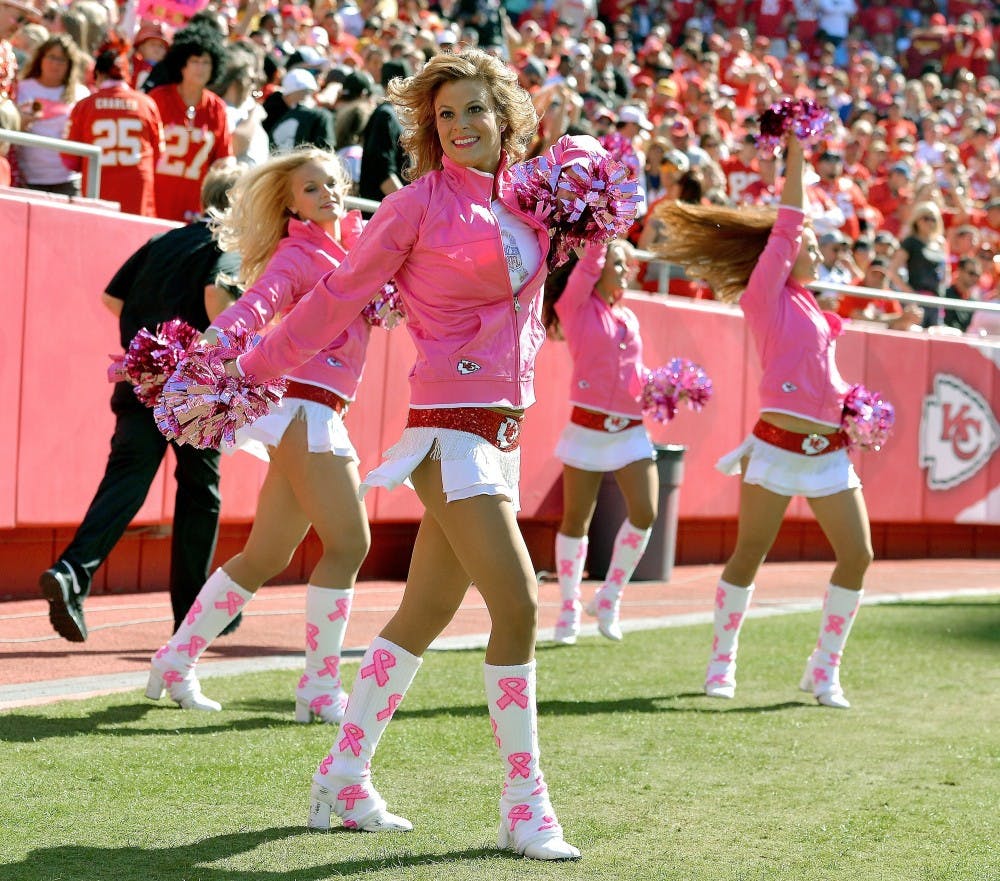It’s a sea of pink. Cheerleaders, football players, National Football League logos and fans sporting their Breast Cancer Awareness Month paraphernalia; so much pink it looks like it came straight out of the bedroom of a 6-year-old girl.
But the sad truth about this month-long Pink October campaign: It’s a lie.
The NFL flaunts the fact that 100 percent of its pink labeled proceeds go to the American Cancer Society, but in a 2013 article, using information obtained by the NFL, Business Insider revealed that the money is divided up, with more than 50 percent of the profits going to the NFL and 8.01 percent going to the ACS.
Additionally, after the article was published, the ACS revealed that the money it received from the NFL didn't even go to cancer research and that it "has nothing to do with (their) research programs.”
So amid the feel-good pink and the ribbons covering every product imaginable, there is also an air of deception and greed.
Unfortunately, the NFL is not the only major corporation to use, of all things, breast cancer as a marketing tool.
 Most companies who utilize that alluring pink ribbon use intentionally vague descriptions, throwing around phrases like “a portion of the proceeds.” Their vagueness provides them with a lot of flexibility and yes, a lot of money. It gives them the ability to set a minuscule percent of the cost of the product or even set a cap on the the money donated. Therefore, if the company already reached the amount of proceeds it planned to donated, zero percent of the money used to pay for the product you buy actually goes toward the cause.
Most companies who utilize that alluring pink ribbon use intentionally vague descriptions, throwing around phrases like “a portion of the proceeds.” Their vagueness provides them with a lot of flexibility and yes, a lot of money. It gives them the ability to set a minuscule percent of the cost of the product or even set a cap on the the money donated. Therefore, if the company already reached the amount of proceeds it planned to donated, zero percent of the money used to pay for the product you buy actually goes toward the cause.
Likewise, corporations like Kentucky Fried Chicken, used the pink label despite the fact that they’ve been know to add to the obesity epidemic, a health issue which leads to about a 25 percent increase in women’s chances in getting breast cancer.
Alcohol companies, such as Mike’s Hard Lemonade, also decided to jump on the pink ribbon bandwagon despite the fact that alcohol is known to increase risk of cancer as well.
Essentially these corporations raise funds to fight breast cancer, while simultaneously facilitating it, using their campaign as a mask to hide the actual issue behind their products.
Other times, companies simply use the color pink to “symbolize” Breast Cancer Awareness. For instance, Staples sells pink papers clips that “represent the fight,” but in reality don’t donate any actual money. How paper clips relate to a deadly epidemic, the world may never know.
But how effective is this marketing tactic? In a 2009 poll it was revealed that 79 percent of consumers would switch to brands that claimed they supported a cause. The trust of the public in these matters, probably because no one would suspect anyone would be so gluttonously greedy as to exploit cancer for money, allows the companies to raise both the circulation and the prices on the goods.
Looking at the situation as a whole, Breast Cancer Awareness is, at its core, a feel-good marketing ploy. Instead of raising money to say, donate to the actual research, it is used to further promote the idea of awareness which, in turn, allows them to continue to capitalize on a disease that plays on the emotions of people affected by the disease, a.k.a. everyone.
It’s an endless cycle that needs to stop. If companies intend to actually raise awareness on issues, then it should be on issues that actually count because, let’s face it, everyone knows what breast cancer is. Perhaps the NFL should focus less on breast cancer and more on issues like domestic abuse, something that actually pertains to them.
Likewise, raising awareness about breast cancer needs to stop and raising action needs to begin. In order to actually cure the disease once and for all, proceeds need to start going to research and helping cancer patients and not to fruitless marketing campaigns dedicated to raising awareness on an issue nearly everyone has been affected by in some measure.
Reach the columnist at mjanetsk@asu.edu or follow her on Twitter @meganjanetsky
Editor’s note: The opinions presented in this column are the author’s and do not imply any endorsement from The State Press or its editors.
Want to join the conversation? Send an email to opiniondesk.statepress@gmail.com. Keep letters under 300 words and be sure to include your university affiliation. Anonymity will not be granted.
Like The State Press on Facebook and follow @statepress on Twitter.




